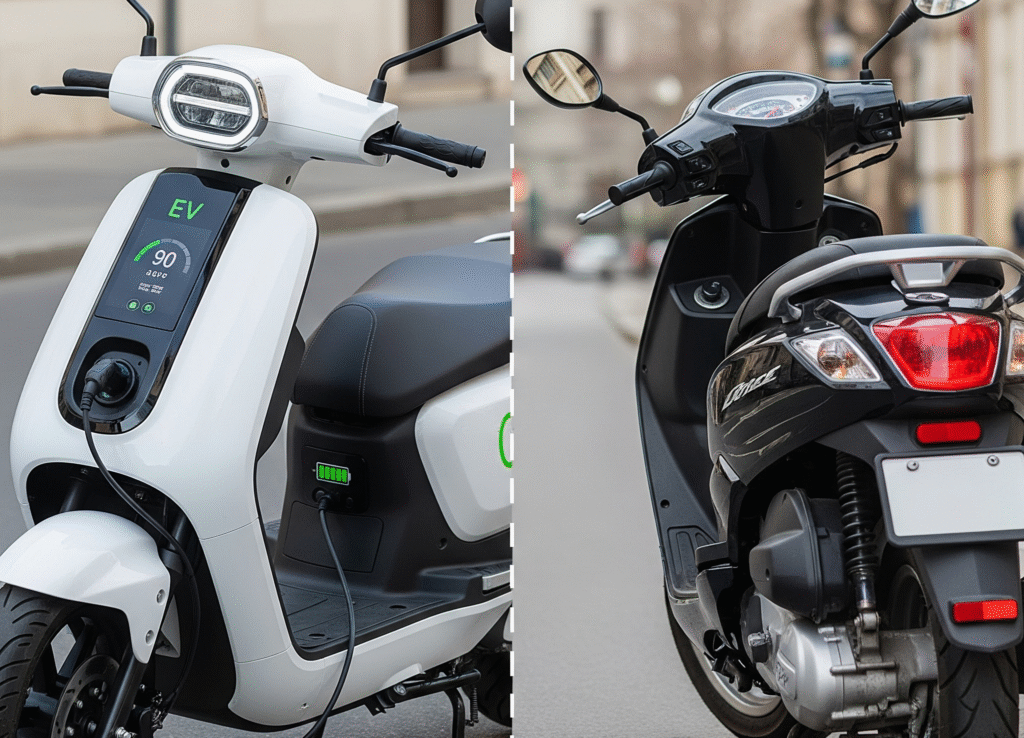EV Scooter vs Petrol Scooter: Real Cost of Ownership in 2025 – What’s Cheaper?
The Indian two-wheeler market is undergoing a major shift in 2025. While petrol scooters have been the go-to option for decades, electric scooters (EVs) are quickly catching up — thanks to rising fuel prices, government incentives, and growing environmental awareness. But beyond the buzz, one crucial question remains: Which is cheaper in the long run – an EV scooter or a petrol scooter?
Purchase Price Comparison – EV Scooters vs Petrol Scooters
| Scooter Type | Average Price Range (INR) |
|---|---|
| Electric Scooter | ₹85,000 – ₹1,40,000 |
| Petrol Scooter | ₹75,000 – ₹1,20,000 |
Electric scooters are generally priced slightly higher upfront due to battery costs. For example:
Ola S1 X+: ₹89,999 (Ex-showroom)
TVS iQube: ₹1.25 lakh (On-road)
Honda Activa 6G (Petrol): ₹91,000 (On-road)
Suzuki Access 125 (Petrol): ₹95,000 (On-road)
Customer Review – Priya Sharma (Bangalore)
“I was hesitant to pay more for the iQube, but with subsidies and low charging costs, I’ve already saved over ₹10,000 in 6 months.”
Fuel vs Charging Cost – Why EVs Win in 2025
| Factor | Petrol Scooter | EV Scooter |
|---|---|---|
| Average Cost/km | ₹2.3 – ₹3.0 | ₹0.20 – ₹0.30 |
| Monthly Cost (30 km/day) | ₹2,100 – ₹2,700 | ₹180 – ₹270 |
Charging an electric scooter at home costs just ₹10 – ₹20 for a full charge. Over a year, this can save users more than ₹20,000 in fuel alone.
Maintenance: EVs Need Less Attention
Petrol scooters require regular oil changes, engine tuning, air filter replacements, and clutch work. In contrast, EVs have fewer moving parts, no engine oil, and are nearly maintenance-free.
| Annual Maintenance Cost |
|---|
| Petrol Scooter: ₹3,000 – ₹5,000 |
| EV Scooter: ₹500 – ₹2,000 |
Customer Feedback – Rohit Mehta (Delhi)
“In 15 months of riding my Ather 450X, I’ve only paid for one brake pad replacement. My friend with a petrol scooter has already spent ₹8,000 on service!”
Battery Replacement vs Engine Wear
Battery replacement is a key factor in EV TCO (Total Cost of Ownership). Most EV batteries last 5-7 years and cost ₹20,000 – ₹40,000.
However, engines of petrol scooters often show wear and require major repairs or resale after 4–5 years.
Government Subsidies and Incentives (2025 Update)
In 2025, many Indian states continue to provide:
₹10,000 – ₹25,000 EV subsidies
100% road tax exemption
Free/discounted registration
Petrol scooters? No such perks.
🚩 Example:
In Delhi, you can buy an electric scooter like the Bounce Infinity E1 for ₹65,000 after subsidy.
Resale Value – Catching Up
Petrol scooters still retain slightly higher resale value. However, newer EVs like TVS iQube, Ather 450S, and Ola S1 Pro are gaining demand in the second-hand market.
Environmental and Noise Benefits
EVs:
Zero tailpipe emissions
Silent ride (good for urban areas)
Lower carbon footprint
Petrol:
CO2 and NOx emissions
High noise levels
Customer Reviews & Real-World Feedback
Aman Verma, Pune (Ola S1 X+ owner):
“In one year, I’ve saved more than ₹15,000 on fuel. Smooth ride, and the new MoveOS updates are a bonus.”
Sneha Reddy, Hyderabad (TVS Jupiter owner):
“I trust petrol scooters for long commutes. EVs are great but I worry about charging during trips.”
Rajeev Sharma, Delhi (Ather 450S owner):
“Amazing pickup and zero maintenance. Only wish the range was slightly higher for my weekend drives.”
Choose an EV Scooter if:
You ride 25–40 km daily
Want low maintenance and fuel savings
Live in a city with good EV infrastructure
Choose a Petrol Scooter if:
You frequently travel to rural areas
Prefer quick refuelling over charging
Want lower upfront cost
With models like Ola S1 X+, TVS iQube, Ather 450S, and Vida V1, the EV space is no longer experimental—it’s practical, economical, and here to stay. The real cost of ownership clearly leans in favor of electric scooters in 2025.
